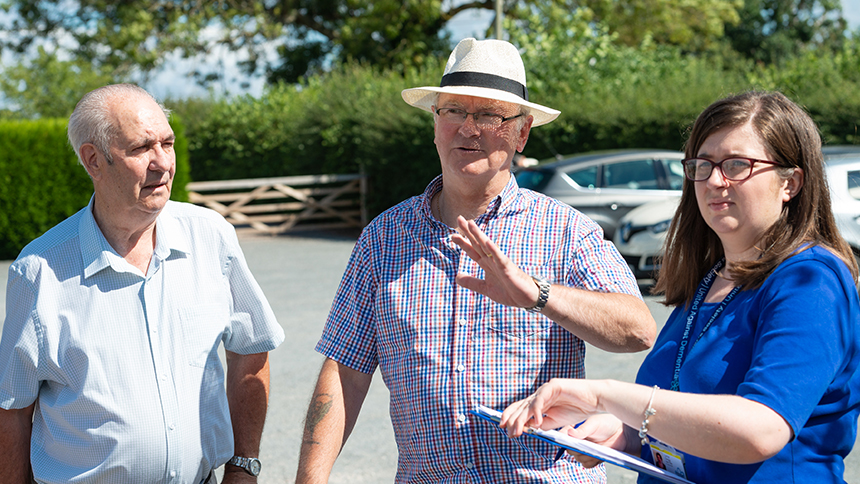Expert input: People with dementia helping their cathedral become more accessible
Hereford Cathedral asked local people with dementia about how to become dementia friendly.

Keen to become more accessible to people with dementia, Hereford Cathedral decided to call on the experts.
The Usurpers – part of our network of people affected by dementia who have their say on local and national topics – were happy to step up.
The Hereford group chose their tongue-in-cheek name because of our original description of these groups as service user review panels, or ‘SURPs’.
Dementia voice
Use your first-hand experience to help shape our work, and ensure everything we do reflects the needs of people affected by dementia
Free rein
The Usurpers were given a private tour of the cathedral, which dates from the 11th century, so they could identify any potential issues. This included an area where the cathedral hopes to create a quiet space for people with dementia and others.
‘Essentially, we were given free rein to wander around and poke our noses in all areas,’ says Dave Daniel, 51, who has Alzheimer’s.
‘We were actively encouraged to be curious and ask questions.’
The tour was followed by an in-depth session where the Usurpers put their suggestions to cathedral staff.
The Usurpers thought that cathedral staff and volunteers should become Dementia Friends to better understand the difference they could make.
Ideas included having a sign at the entrance to say the venue is accessible for people with dementia, as well as generally larger signage throughout.
They discussed how people with dementia could benefit from more clearly defined outdoor pathways and different colour schemes for the café, toilets and exhibition space.
The Usurpers thought that cathedral staff and volunteers should become Dementia Friends to better understand the difference they could make. Seeing staff wearing Dementia Friends badges would also give people with the condition more confidence to approach them.
Taken seriously
Within a month of the group’s visit, cathedral volunteers had begun attending Dementia Friends information sessions and the sign at the front of the building was in place. The cathedral had also introduced special quiet hours at specific times.
‘Some projects can take three to five months before we receive feedback, so that was very positive,’ says Lorna Gregg, a Dementia Adviser who supports the Usurpers.
The cathedral’s response has been welcomed by group members.
Her Society colleague Sarah Goodger feels the cathedral already had quite a good understanding of dementia.
‘I think the group helped give them more direction and focus towards becoming a dementia-friendly setting,’ she says.
The cathedral’s response has been welcomed by group members.
‘It is rewarding to know that those in charge are not only dementia aware but are being proactive in the way they tackle the issue,’ says Dave.
‘It is sadly not the norm to be taken seriously as soon as someone knows you have dementia, so to find such a forward-thinking organisation was fantastic.’
'It is vitally important that local communities ensure everywhere is accessible and inclusive to people with dementia,’ says Andy.
Another Usurper, Andy, was diagnosed with dementia with Lewy bodies six years ago.
He says, ‘It’s good to feel that organisations in Herefordshire are interested in raising staff awareness of dementia and improving access. It is vitally important that local communities ensure everywhere is accessible and inclusive to people with dementia.’
Dave says that organisations need to recognise the realities of dementia.
‘Dementia still carries an element of stigma, but the more big businesses embrace and normalise it in their world, the quicker wider opinion will change.’

